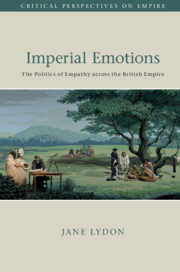Book contents
- Imperial Emotions
- Critical Perspectives on Empire
- Imperial Emotions
- Copyright page
- Dedication
- Contents
- Figures
- Acknowledgements
- Introduction: Emotions and Empire
- 1 Children of Empire: British Nationalism and Colonial Utopias
- 2 Colonial ‘Blind Spots’: Images of Frontier Conflict
- 3 Australian Uncle Tom’s Cabins
- 4 The Homeless of Empire: Imperial Outcasts in Bleak House
- 5 Christian Heroes on the New Frontier
- 6 Charity Begins at Home: Philanthropy, Magic Lantern Slides and Missionary Performances
- 7 The Republican Debate and Popular Royalism: ‘a Strange Reluctance to Actually Shout at the Queen’
- Bibliography
- Index
1 - Children of Empire: British Nationalism and Colonial Utopias
Published online by Cambridge University Press: 30 September 2019
- Imperial Emotions
- Critical Perspectives on Empire
- Imperial Emotions
- Copyright page
- Dedication
- Contents
- Figures
- Acknowledgements
- Introduction: Emotions and Empire
- 1 Children of Empire: British Nationalism and Colonial Utopias
- 2 Colonial ‘Blind Spots’: Images of Frontier Conflict
- 3 Australian Uncle Tom’s Cabins
- 4 The Homeless of Empire: Imperial Outcasts in Bleak House
- 5 Christian Heroes on the New Frontier
- 6 Charity Begins at Home: Philanthropy, Magic Lantern Slides and Missionary Performances
- 7 The Republican Debate and Popular Royalism: ‘a Strange Reluctance to Actually Shout at the Queen’
- Bibliography
- Index
Summary
During the period of Britain’s colonial expansion in the eighteenth century, the ‘cult of sensibility’ emerged across Europe and America. Domestic experience gave meaning to imperial ties, as the British nurtured fond plans for the Antipodean colonies of Australia and New Zealand as children of the British Empire, one day to assume a glorious inheritance. Smith’s emphasis on social nearness rather than feeling at a distance exemplifies the ambivalence of ‘fellow feeling’ or empathy. Resentment, condescension, and fear of degeneration as evoked by the ‘future tourist’ or ‘New Zealander’ undermined this relationship and defined the limits of imperial ‘fellow feeling’, with implications for temporal and racial human hierarchies. By contrast, French naturalist Jacques-Julien Houtou de Labillardière’s cosmopolitan re-orientation of these schemes brought humankind into a single political community, in which Indigenous peoples were fully human. Yet Australian Aboriginal people became the objects of a nostalgic imperial discourse of extinction, naturalizing conquest and relegating them to the new colonies’ past.
Keywords
- Type
- Chapter
- Information
- Imperial EmotionsThe Politics of Empathy across the British Empire, pp. 25 - 50Publisher: Cambridge University PressPrint publication year: 2019

